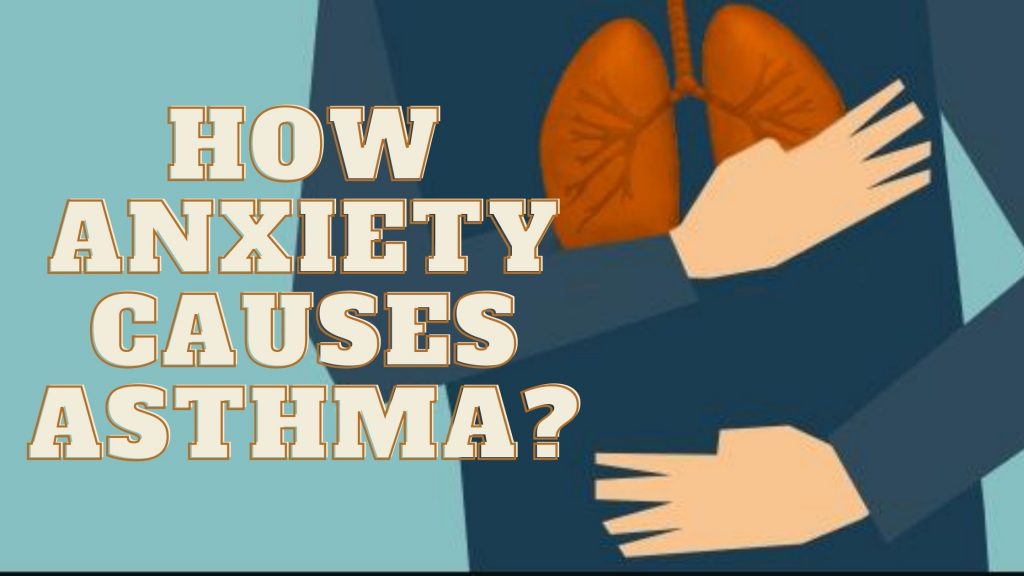How Anxiety Causes Asthma?
You are going through a lot lately, pending bills, the tension of presentation, school projects or dealing with your kids. Adding to that are your daily shortness of breath, chest tightening and wheezing. Now in such situations, you might get confused whether it is anxiety or asthma attack.
Anxiety cannot be said to be the cause for asthma but it only worsens the symptoms for a person who is already a patient. Also, someone who is unknowingly prone to asthma is pushed towards it quicker if he is going through anxiety.

But the opposite is more frequently seen. Often asthma patients are seen to develop anxiety disorders if they poorly control asthma. What we mainly need to understand is that how if we lag in controlling anxiety, our control over asthma also reduces.
What is Asthma?
You might not know how common disease asthma is. In the US more than 22 million people and nearly 6 million children suffer from asthma. It causes a lot of havoc in life like people miss out work, children often miss school and sometimes people even die from sudden asthma attacks.
Asthma is a disease which causes inflammation in the airways to your lungs, blocking your breath. The most common symptoms are:
- Tightness in chest
- Chronic cough
- Shortness of breath
- Wheezing
Mostly these symptoms take place when the airways narrow down, tightening the respiratory muscles due to swelling or accumulation of mucus.
But if you experience any wheezing do not be sure that it is an asthma symptom because often anxiety or depression leads to wheezing. So it’s better to check from a doctor and make sure you are getting the proper treatment.
How asthma and anxiety are linked?
- Common symptoms
Living in today’s world is not easy and anything can provoke anxiety. The body reacts to anxiety by releasing hormones which can be the cause for inflammatory reactions within your body, triggering the asthma symptoms. You may feel shortness of breath. And the situation can be anything, it can be the pressure of work presentation or school examinations or even arguing with someone. Such moments cause the body to release histamine or leukotrienes. These chemicals play an important part in the pathophysiology of asthma.
- Anxiety harms Asthma Preventive Routines
It is very common that stress or anxiety disrupts our mental and physical health. They occupy our mind and distracts us from the important preventive measures. During a trip, you might get so occupied thinking about who would water your plants, you forget to pack your inhaler. Such mistakes often cause big emergencies.
- Unmaintained Asthma can increase anxiety symptoms
Sometimes people become lenient towards their health and that’s when anxiety and depression swoop in. Asthma patients are noticed to be more prone to anxiety than people who are not asthmatic.
How to manage asthma and anxiety?
- Find out what is triggering your anxiety level. There can be a lot of things, family issues, romantic relationships, financial issues or dreadly deadlines. If you are unable to identify the cause or fail to manage it, professional help is always open.
- Exercise every day to tone down the stress and anxiety. It helps in channelling your energy in the right path.
- Get enough and sound sleep.
- Go for meditation or yoga to soothe your mind.
- Biofeedback is another great solution.
Is Asthma curable?
Although there is no permanent solution for asthma, it can be highly controlled with a proper action plan.
- Track down your symptoms
- Notice if you are facing shortness of breath or wheezing when you exhale.
- Are you having a disrupted sleep due to breathing problem or coughing?
- Tightness in chest or pain
- How many times you are having to use a quick-relief inhaler?
- Disturbance in your day-to-day activities due to asthma symptoms
- What is flaring up your asthma symptoms?
- Keep a record of how your lungs are working
Peak flow: This can be done even at your home with a peak flow meter. The readings tell you how quickly you can breathe out air of your lungs.
- Spirometry:
This test is done to measure the amount of air your lungs can hold and the amount of air you can exhale in one second after taking a deep breath. The readings are called forced expiratory volume (FEV 1).
- Adjust treatment according to the frequency of symptoms
Symptoms of coughing, wheezing, shortness of breath: In well-controlled state two days a week or less.
- In a poorly controlled state, more than two days a week.
- In a very poorly controlled state, daily and throughout the night.
Disturbed sleep:
- In a well-controlled state, 2 times a month.
- In a poorly controlled state, one or three times a week.
- In a very poorly controlled state, 4 times a week or more.
Effect on daily activities:
- In a well-controlled state, not experienced.
- In a poorly controlled state, sometimes.
- In a very poorly controlled state, very frequently.
Use of quick-relief inhaler:
- In a well-controlled state, 2 days a week or less.
- In the poorly controlled state, more frequently than 2 days a week.
- In a very poorly controlled state, many times a day.
The only way to treat asthma is long-term control medications which prevent the inflammation of the airways and reduce the chances of asthma flare-ups.
For emergencies, quick-relief inhalers are the fastest acting medication. This acts quickly to open up the airways and make the patient breathe easily
